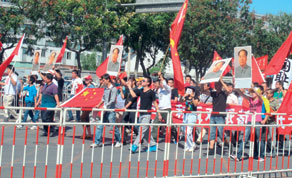By Liah Greenfeld/Boston
The anti-Japan protests that continue to roil China are just another indication of the rise of a potent Chinese nationalism. After a century slowly fomenting among Chinese intellectuals, national sentiment has captured and redefined the consciousness of the Chinese people during the last two decades of China’s economic boom. This mass national consciousness launched the Chinese colossus into global competition to achieve an international status commensurate with the country’s vast capacities and the Chinese people’s conception of their country’s rightful place in the world.

Anti-Japan demonstrators in Beijing marching near the Japanese embassy on September 18. Despite China’s embrace of capitalism and Japanese investment, Japan remains China’s reviled otherchi
Rapidly, visibly and inevitably, China has risen. Indeed, our era will likely be remembered as the time when a new global order, with China at the helm, was born.
Competitive national consciousness – the consciousness that one’s individual dignity is inseparably tied to the prestige of one’s “people” – worked its way into the minds of China’s best and brightest between 1895 and 1905. In 1895, China was defeated by Japan, a tiny aggressor whom the Chinese dismissively called wa (the dwarf). China was already accustomed to rapacious Western powers squabbling over its riches, but had remained self-confident in the knowledge of these powers’ irrelevance.
However, the assault from Japan, a speck of dust in its own backyard, shattered this self-assurance and was experienced as a shocking and intolerable humiliation.
Japan’s triumph in 1905 over “the Great White Power”, Russia, repaired the damage to China’s sense of dignity. From the Chinese point of view, Russia was a formidable European power, one feared by other Western powers. Its defeat, therefore, was seen as a successful Asian challenge to the West, in which China, its intellectuals felt, was represented by Japan.
Japan thus became the focus of Chinese attention. Gentlemen-scholars, who would reform and staff the Chinese army and civil service in the early decades of the twentieth century, went to study in Japan. The Revolution of 1911 was inspired by the example of Japan’s Meiji Restoration; and, because early-twentieth-century Japan was stridently nationalistic, the new China that emerged from its image was constructed on nationalist principles as well.
Thus Japan became the significant “other” for China, the model that was imitated and the anti-model that was resented. Chinese nationalism borrowed from Japan its concept of the nation, including the very word by which it was expressed (kuoming, from the Japanese kokumin). The
Kuomintang (the Chinese Nationalist Movement) was explicitly inspired by Japan and fuelled by repeated Japanese aggression.
Paradoxically, but not unexpectedly, Mao Zedong’s struggle against the Kuomintang was inspired by anti-Japanese nationalism as well. As was the case virtually everywhere else, communism in China was nationalism incarnate. Mao’s speech on the establishment of the People’s Republic plainly expressed the nationalist agenda behind it.
Calling the nation “communist” assured the new People’s Republic of China of the Soviet Union’s support, which was viewed by Mao as more reliable than that of the United States. But neither the Russian nor the Chinese Communists were ever unclear about the nationalist nature of their respective projects.
The upper echelons of the bureaucracy and intelligentsia in Russia and China were self-consciously nationalist and, throughout Communist rule, shrewdly pursued the supreme nationalist goal: prestige – the power, naked and otherwise, to impose the nation’s will on others. But national consciousness, particularly in China, was limited to a narrow elite, leaving the masses almost untouched.
This changed dramatically with the Chinese government’s restoration of a capitalist economy. Much like in Germany in the 1840’s, when the appeal to private enterprise converted the entire middle class to nationalism, the explicit definition of economic power as the central pillar of China’s greatness awakened ordinary Chinese to nationalism’s appeal.
Hundreds of millions now see themselves as sharing in the nation’s dignity, and are eager to contribute to it, as well as to defend it from insult.
Competition for prestige, even when the contest is economic, is not a purely rational undertaking. So it should be no surprise that old injuries are likely to resurface. Some Chinese, especially those who are not economically successful, harp bitterly on Japan’s past depredations.
Despite China’s embrace of capitalism and Japanese investment, Japan remains China’s reviled other. Indeed, a professor in Beijing told me not long ago: “Two in every 10 Chinese dislike the US, but nine in every ten hate Japan.”
For the West, there is a silver lining in this nationalist rivalry: neither China nor Japan is a rogue state, and, so long as their quarrels do not lead to the use of unconventional weapons, we may treat the friction between them as an internal Asian quarrel. Japan, moreover, is likely to let today’s passions over disputed islands in the East China Sea cool down, despite the anti-Japanese outbursts in Chinese cities.
But the West – and the US in particular – is new to dignity games à la Chinois. If it gets carried away and presumes to talk down to the 5,000-year-old culture of the Sages, the West could become the next object of China’s nationalist resentment. - Project Syndicate
l Liah Greenfeld, professor of sociology, political science, and anthropology at Boston University, is visiting professor at Lingnan University, Hong Kong. She is the author of Nationalism: Five Roads to Modernity, The Spirit of Capitalism: Nationality and Economic Growth, and the forthcoming Mind, Modernity, Madness: The Impact of Culture on Human Experience.

